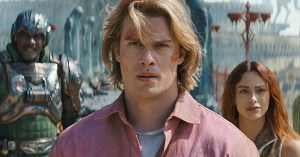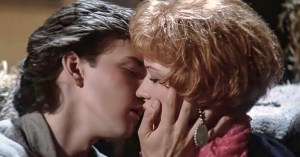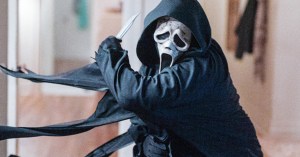Matt Dillon’s Best Movies
In this week's Total Recall, we count down the best-reviewed work of the Sunlight Jr. star.
For a lot of teen idols, all that screaming adulation is a one-way ticket to oblivion — but it can also be the first step in a long career. A case in point: Matt Dillon, who suffered his share of professional setbacks after rising to glowering fame in films such as The Outsiders and Rumble Fish, only to re-emerge at the end of the 1980s as a versatile actor with dramatic depth (Drugstore Cowboy) to match his gift for comedy (There’s Something About Mary). With Dillon appearing in Sunlight Jr. this weekend, we thought now would be a great time to revisit some of his many critical highlights. It’s time for Total Recall!
10. The Saint of Fort Washington
It can be tricky for a filmmaker to split the difference between “socially conscious” and “heavy-handed,” but with 1993’s The Saint of Fort Washington, director Tim Hunter managed to stay mostly on the right side of the line while telling the story of a schizophrenic man (Dillon) who’s turned out onto the streets after the tenement where he’s been sleeping is torn down. Beset by local bullies, he finds himself in desperate need of a friend — and finds one in a homeless veteran (Danny Glover) who helps him adjust to life on his own. “Whatever its shortcomings,” argued Janet Maslin for the New York Times, “The Saint of Fort Washington takes its subject very seriously, in ways that no audience can fail to find wrenchingly sad.”
9. Beautiful Girls
With Ted Demme behind the cameras, a script by Scott Rosenberg (High Fidelity), and a stellar ensemble cast that included Dillon, Uma Thurman, Natalie Portman, Mira Sorvino, and Timothy Hutton, how did Beautiful Girls end up grossing less than $11 million at the box office? Chalk it up to another of life’s mysteries, but don’t miss this tenderly drawn portrait of a group of friends grappling with the twilight of their 20s in a small Midwestern town. Though critics were quick to point out that dialogue-heavy films about maturity-fearing young adults weren’t exactly novel, particularly during the mid-1990s, most reviews echoed the sentiments of Empire’s Darren Bignell, who wrote, “This film really succeeds with its warm treatment of ordinary hang-ups — no life-shattering revelations or pain repressed since childhood, just the genuine, everyday trials of life.”
8. Singles
Dillon celebrated the flannelriffic early 1990s by growing his hair out and sporting a soul patch for Cameron Crowe’s Singles, a Seattle-set, grunge-fueled look at the romantic entanglements of a group of Seattle twentysomethings. (If it sounds like a West Coast version of a certain long-running sitcom, there’s a reason: NBC’s foiled attempt to turn Singles into a series resulted in Friends.) Here, Dillon plays Cliff Poncier, the brooding frontman of Seattle band Citizen Dick (played by future members of Pearl Jam), whose relationship with Bridget Fonda’s character acts as a counterpoint to the commitment struggles of another couple (played by Kyra Sedgwick and Campbell Scott). Released just as grunge artists were really starting to dominate the charts, Singles was more of a soundtrack phenomenon than a box office hit, but it found favor with most critics — including Kevin N. Laforest of the Montreal Film Journal, who wrote, “Brilliant dialogue, killer musical cues and hilarious comic beats. It made me happy, it made me cry… Right movie, right time.”
7. Tex
Dillon followed his turn as the unctuous bully in My Bodyguard with the title role in Tim Hunter’s adaptation of the S.E. Hinton novel Tex — a character described in the synopsis as “sweet” and “slightly dim.” Critics were also pretty sweet on this Disney-distributed coming-of-age story, which follows the young McCormick brothers (played by Dillon and Jim Metzler) as they struggle to move on with their lives following the death of their mother and their abandonment by their father; as Roger Ebert summed it up in his review, “There is a shock of recognition almost from the beginning of Tex, because we’re listening to the sound of American voices in an authentically American world.”
6. There’s Something About Mary
Matt Dillon isn’t generally known for his comedic skills, but with There’s Something About Mary, he proved he could hold his own against a cast of funny people that included Ben Stiller, Chris Elliott, Sarah Silverman, and Jeffrey Tambor. Spending a great deal of the film in garishly capped teeth — and serving as the centerpiece of some of the movie’s most uncomfortably uproarious bits — Dillon helped send the Farrelly brothers’ cinematic coming-out party to a $369 million worldwide gross, and was a healthy part of why Kenneth Turan of the Los Angeles Times deemed it “a giddy symphony of rude and raucous low humor.”
5. My Bodyguard
“Terrorized in the toilet? Chased after school? Shaken down for your lunch money? GET A BODYGUARD!” This was the advice offered by the poster for 1980’s My Bodyguard, which starred Dillon as the loathsome bully Melvin Moody, whose constant torment drives hapless outcast Clifford Peache (Chris Makepeace) to hire a protector (played by Adam Baldwin). In a decade filled with half-baked teen flicks, this had the potential to be some pretty uninspired stuff, but Bodyguard actually ended up being one of the year’s biggest hits, both at the box office and with critics. It’s “A sweet little movie about characters who really seem to be people,” according to Janet Maslin of the New York Times, who noted that — then as well as now — “that sort of verisimilitude is rarer than it ought to be nowadays.”
4. To Die For
Dillon reunited with Drugstore Cowboy director Gus Van Sant for 1995’s To Die For, a black comedy starring Nicole Kidman as a sociopath who uses her wiles to convince a high school student (Joaquin Phoenix) to murder her husband (played by Dillon). While it wasn’t a major commercial success, Die resonated strongly with critics, proved Kidman’s versatility, and cemented the career comeback Dillon started in the late 1980s. “If you’ve hitherto failed to respond to the laid-back oddball appeal of Van Sant’s movies, fear not,” wrote Geoff Andrew for Time Out, calling the film “a sharp, consistently funny blend of black comedy and satire on the deleterious effects of television.”
3. The Flamingo Kid
Dillon followed up his roles in the S.E. Hinton trilogy (Tex, Rumble Fish, and The Outsiders) with the lead in Garry Marshall’s The Flamingo Kid, a coming-of-age comedy about a Brooklyn teen whose summer job at an exclusive Long Island beach resort leads to the requisite life lessons (as well as some of the first PG-13 T&A). Though critics were less than impressed with Marshall’s slick direction (Andre Sennwald of the New York Times said it came “out of sitcom country”), they found favor with the script, not to mention Dillon and Richard Crenna’s performances. As Erik Childress of the Apollo Guide put it, “The Flamingo Kid is one of those rare films that follows a traditional method of coming-of-age storytelling and then shakes it up by not dealing us mere caricatures and stereotypes.”
2. Over the Edge
Although it didn’t make much of a dent in theaters during its limited run, 1979’s Over the Edge is notable for a few reasons, not the least of which is the fact that it marks the big-screen debut of a 14-year-old Matt Dillon. One of the decade’s more sensitively constructed looks at suburban teen angst, Edge focuses on a group of kids chafing under the restrictions of life in their community while heading for a fateful confrontation with local law enforcement. Observed the Chicago Reader’s Dave Kehr, “Director Jonathan Kaplan has a fine feel for the crushing blandness of ‘planned communities’ — the anger that possesses his underage heroes proceeds from a physically oppressive emptiness, represented by rows of hollow townhouses and vast, blasted fields.”
1. Drugstore Cowboy
Dillon’s career cooled considerably during the mid-to-late 1980s, but he continued to work steadily — and he continued to improve as an actor, too, as evidenced by his stellar work in 1989’s Drugstore Cowboy. Adapted by James Yost, William S. Burroughs, and director Gus Van Sant from James Fogle’s autobiographical novel, Cowboy follows the adventures of Bob Hughes (Dillon), the leader of a crew of drug-addicted bandits who support their habit by robbing pharmacies. A gritty, darkly comic tale of squandered potential, soul-shattering loss, and the elusiveness of redemption, the movie earned Dillon an Independent Spirit Award for Best Actor — and critical praise from scribes such as Desson Thomson of the Washington Post, who wrote, “Ultimately it’s Dillon who has the biggest score; he makes this stark trip a heady, hopeful one.”
In case you were wondering, here are Dillon’s top 10 movies according RT users’ scores:
1. Crash — 87%
2. Drugstore Cowboy — 82%
3. The Outsiders — 79%
4. Over the Edge — 79%
5. Beautiful Girls — 77%
6. Rumble Fish — 76%
7. Grace of My Heart — 73%
8. Singles — 70%
9. My Bodyguard — 66%
10. Tex — 66%
Take a look through Dillon’s complete filmography, as well as the rest of our Total Recall archives. And don’t forget to check out the reviews for Sunlight Jr..
Finally, here’s Dillon reading a passage from Jack Kerouac’s On the Road:





